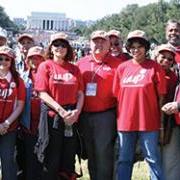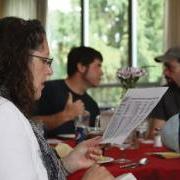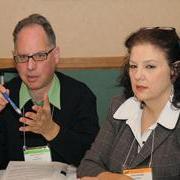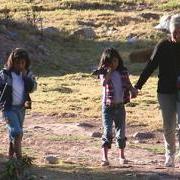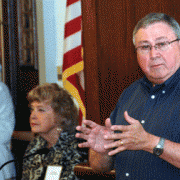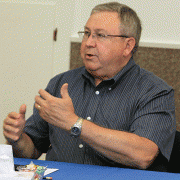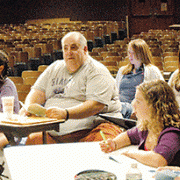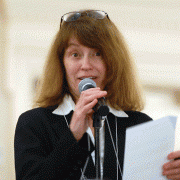|
As soon as he heard about the One Nation Working Together march for better jobs, public education and economic justice, Upstate Medical University UUPer Brian Tappen started making plans. He made a list of what he wanted to pack for the one-day, round-trip trek to the nation’s capital. Let’s see: two digital cameras; four lenses; 64GB of memory; tripod; stool; UUP chapter banner; fold-out maps of D.C. and the Metro rail; cowbell; whistle; harmonica; set of juggling clubs; Bicycle. Tappen—who was among a busload of NYSUT and UUP members to leave Syracuse just after midnight Oct. 2—put his backpack on the bus and his bike in the storage hold below. “They all thought I was crazy and mocked me for bringing my bike on the bus,” said Tappen, a statewide Executive Board member. “But when we got to D.C. and I was quickly on my way, they didn’t think it was such a crazy idea after all.” Tappen pedaled the four miles from RFK Stadium to the National Mall, where he began texting his union colleagues to tell them his location. Dozens of UUPers from chapters around the state were traveling by bus, train and car to add their voices to the more than 175,000 other unionists and human rights, faith and workers’ rights activists for the march. Calls made and texts sent, Tappen then began taking photographs. “The march is an historic event in support of education and jobs that I shared with my sisters and brothers in UUP?and NYSUT,” Tappen said. “I brought my cameras to record the event for me and my compatriots.” Tappen was soon joined by a group of two dozen UUP officers and members who made the trip following the 2010 Fall Delegate Assembly in Buffalo. “Jobs and education are two of the most fundamental tenets of academic unionism,” said UUP?President Phil Smith. “When the call to action went out, UUP gladly answered it.” Participants called on Congress to act on the issues they voted for: preserving public education and access to health care; jobs for all; a strong, stable economy; and unity, not division. “More than 400 groups were represented. I spoke with an alphabet soup of organizations too numerous to list, but it included folks from NYSUT, AFT, NEA, the NAACP, UAW, IBEW and CWA,” Smith added. “It was awesome, inspiring, incredible!” Smith was far from alone in his assessment of the One Nation march. “This has been a totally moving experience,” said Farmingdale UUPer Deb Nilsen, who boarded a NYSUT-sponsored bus on Long Island with a handful of her UUP colleagues. “It’s amazing to be part of the Big Event, the grandeur.” UUPer Idalia Torres of Fredonia spent a lot of her time sending her husband text updates of the action. “He wanted to come and see One Nation, page 8 march with me, but we couldn’t afford it,” Torres said. “He is one of the many people looking for work. It’s important for us to be here, to make a statement.” The leaders of UUP’s national affiliates—AFT President Randi Weingarten and NEA President Dennis Van Roekel—lent their voices to the cause. Speaking from the steps of the Lincoln Memorial, Weingarten said, “Today is about one nation standing together—and a good education is the foundation for everything else we seek today.” “Teachers work hard every day to make a difference in young people’s lives,” Weingarten noted. “But teachers can’t do it alone.” They need the support of parents and others in the community to help teachers replicate what works in the country’s most successful public schools, she added. In addressing the crowd, Van Roekel pointed out that “NEA members have come here today from every single state in the union to stand together with our partners, our friends, in our collective commit-ment to jobs, justice and public education.” In addition to hearing from national leaders, UUP members connected with unionists from other AFT and NYSUT affiliates, including busloads of members from the United Federation of Teachers and Professional Staff Congress/CUNY, who battled bumper-to-bumper traffic to march on Washington. After saying his good-byes, Tappen unchained his bike, hopped on and began to pedal back to RFK Stadium. He would then board the bus to arrive home at 2 a.m. Sunday, nearly 26 hours after his journey began. “It was an all-day adventure and it was worth it,” Tappen said. “It was educational, it was fun and, hopefully, it’s productive.” — Karen L. Mattison |
Author Archives: United University Professions Admin
Negotiations Team traverses state to gather member input
|
UUP is quickly moving through the first phase of the negotiations process—collecting input from members. Members of the Negotiations Team began a whirlwind tour of chapters in September, during which they asked UUPers to share their thoughts regarding their terms and conditions of employment. The union will use the information gathered to craft a set of proposals for bargaining with the state. As The Voice went to press, Team members visited more than half of the 33 UUP chapters around the state. The Negotiations Team, the Negotiations Committee and the Ad Hoc Advisory Committee are seeking member input in a number of ways, including an online member suggestion form at www.uupinfo.org/negotiations/index.html, a membership survey, a hearing at the 2010 Fall Delegate Assembly, and in face-to-face meetings with members. “UUP is committed to giving every member ample opportunity to let their union know what they’d like to see in their contract,” said UUP President Phil Smith, who is constitutionally responsible for negotiations. “Members of the Negotiations Team are visiting all of our chapters to make it easier for members to speak their minds.” “It is important for members to know that their comments and concerns will form the basis of what’s in our package of proposals when we sit down to negotiate with the state,” added UUP Chief Negotiator Jamie Dangler of Cortland. “In addition to telling us what you think in face-to-face meetings, we strongly encourage members to fill out the survey and online suggestion form.” Smith will be sending letters to members explaining how to access the online survey. Negotiations Team members traveled to North Country and Western New York chapters, and are wrapping up visits to Central and Southern New York, Nassau and Suffolk counties, the Mid-Hudson region, and Metropolitan-area chapters. During the Fall DA in Buffalo, nearly 100 delegates were on hand to question members of the Team about terms and conditions of employment. Among the topics raised by delegates—as well as by hundreds of members during campus visits—were health benefits, compensation and working conditions. Members also posed questions about specific topics of negotiations. “Throughout the regions and across campus types, UUP academics and professionals are sharing similar stories about what’s really going on at SUNY,” said Associate Chief Negotiator Mike Smiles of Farmingdale. “And we’re listening.” — Karen L. Mattison |
2010 Fall DA: Delegates discuss issues at convention
|
Delegates condemned the retrenchment of Nylink employees, voted to honor a defender of SUNY, and reflected on the failed Public Higher Education Empowerment and Innovation Act (PHEEIA) during the 2010 Fall Delegate Assembly. Also, President Phil Smith appealed to delegates to energize their chapters to help elect candidates endorsed by New York State United Teachers in the November election. More than 200 delegates attended the DA, held last month in Buffalo. Much of the DA’s business was condensed so delegates could participate in the One Nation march Oct. 2 in Washington, D.C. Smith urged delegates to get their chapters involved in local phone banks and other election events. It is imperative to elect lawmakers who understand the importance of higher education in New York and properly funding and maintaining the integrity of SUNY, he said. “This will be a tough year,” Smith said. “We all have to become active. We need you to get out there and get your folks involved.” Delegates voted to register strong disapproval for the Nylink retrench-ments and expressed support for those employees and other System Adminis-tration workers who were furloughed. Smith said there was no need for retrenchments at Nylink, or possible retrenchments at Brooklyn’s Downstate Medical Center, where 39 unionized employees received non-renewal notices in September. SUNY should use some of its nearly $600 million in reserves to alleviate those situations. Chancellor Nancy Zimpher has promised to use $147 million in reserves to make up for SUNY state aid budget cuts; SUNY had not done so as The Voice went to press. Smith put little stock in a “framework” of a deal for PHEEIA announced by Senate Democrats when the state’s 2010-11 budget was passed Aug. 3. The proposal, left out of the budget after strong opposition by UUP and key lawmakers like Assembly Speaker Sheldon Silver, would have essentially corporatized SUNY by allowing campuses to raise tuition and enter into contracts and leases without state oversight, if enacted. “The framework is made out of tooth picks, if there is a framework,” he said. Still, Smith predicted that the nebulous proposal will be back in some form. “We plan to move ahead opposing parts of the plan we don’t like,” he said. Delegates also approved a special order to honor Silver (D-Manhattan) with the Eugene P. Link Award for Outstanding Service. The Assembly speaker stood against PHEEIA despite extreme pressure from SUNY administration and Gov. David Paterson to include it in the spending plan. “We didn’t know what a special friend he was until he spoke out for us this year,” said Nuala McGann Drescher of Buffalo State, who offered the measure. “We have a champion here.” No date was set for Silver’s award ceremony, although the resolution dictated it must be held by April 2011. During the fast-paced DA, delegates participated in back-to-back committee meetings, during which they tackled such topics as women’s rights, part-time and contingent affairs, equity and diversity, affirmative action, technology, and health care. Delegates also: • Honored Vicki Janik of Farming-dale and Larry Wittner of Albany as recipients of the Nina Mitchell Award for Distinguished Service. • Honored Stephen Street of Buffalo State and Elena Eritta of Farmingdale as recipients of the Fayez Samuel Award for Courageous Service by Part-time Academic and Professional Faculty. • Honored Henry Geerken of Cobleskill and Dave Peckham of Upstate Medical University as recipients of the Outstanding Active Retiree Award. • Awarded three SUNY students—Christine Kirkpatrick and Stan McKay of Geneseo, and Katherine Raymond of Oswego—with UUP College Scholarships. • Donated $757 in a special collection to benefit Buffalo area food banks. — Michael Lisi |
Our give backs: Oneonta UUPers plow land with Peruvian orphans
|
Once Oneonta UUP member Betty Tirado heard about the trip, she knew she had to go. It didn’t matter that she didn’t know anyone who was making the three-week trek to El Girasol, a Peruvian orphanage that’s home to more than three dozen “street children,” most of whom begged and lived on the streets of Cusco before finding their way to the sanctuary. It didn’t matter that she had to cover the $3,500 to pay for the trip, set up by fellow UUPer Karen Joest, an Oneonta professor who was touched by the orphans’ plight and arranged the trip as a summer field course so her students could earn college credit while they learned about life. All Tirado knew was that she had to go. “I wanted to do something for someone other than myself, or my family, or locally,” said Tirado, a soft-spoken college accountant who has worked at Oneonta since 1982. “Karen came into the office one day getting travel arrangements straightened out and I talked to her about the trip. I asked her if community members could go. She must have thought I was kidding.” “Betty wanted to learn about the culture and help those kids,” said Joest, who teaches child and family studies. “She worked harder than anyone; she kicked butt. She was like a mom figure to all of us.” Joest’s Peru trip is one of three “Serve and Learn” programs and projects offered at Oneonta. The Peru program is the newest of the three; the others are outreach projects in India and Ghana, run by UUPers Ashok Malhotra and Kathleen O’Mara, respectively. Tirado, Joest and 14 Oneonta students spent most of June in Peru, working with Generations Humanitarian, a Utah-based organization dedicated to helping street children throughout the world. Joest, who had heard of El Girasol from a student who read author Richard Paul Evans’ bestseller The Sunflower, chose Peru because she had been there before and thought it would be an eye-opener for her students. Joest knows all about having to rely on the goodness of others to survive. She grew up in “abject poverty” in an Indiana inner-city project, the daughter of a farmer who lost his farm in a fire and was forced to move because he couldn’t afford to rebuild. “Agencies gave us clothing and stuff and we always tried to give back as much as we could because people gave to us,” said Joest, president of Habitat for Humanity of Otsego County. “One of the things my father always pushed was how important it is to give back to the community.” She also realized how desperately the children and the orphanage needed help. “These are kids with horrific pasts, working in the sex slave trade, and victims of work exploitation and family abandonment, violence and abuse,” she said. “Watching our students connecting and developing relationships with these kids was amazing.” While the language barrier was difficult to overcome—the Peruvian kids and adults spoke Spanish and the Oneonta team spoke English—sometimes no words were needed to communicate. “Everyone cares for each other, there’s a real family atmosphere there,” said Tirado, the mother of three grown children. “It was such an experience for me. There’s nothing I can compare it to.” Joest, Tirado and the students also helped extend the orphanage’s garden, where food is grown to feed the children. They tilled 15 feet of land, which doesn’t sound too tough until you consider they had no modern tools to do the work. “We used a wooden plow and two oxen to plow the field and plant crops,” said Joest. “To us, 15 feet of corn crops is nothing. But to them, it can feed three or four more kids. So we moved rocks and did whatever we could.” Joest said she’s planning another summer studies trip to El Girasol next year. As with the last trip, next year’s trek is open to anyone who wants to come along, Joest said. Tirado was certain that she’d be going back to Peru—at some point. But it will be for a lot longer than the three weeks she spent there in June. Having more time will allow her to be able to give back even more, she said. “I’d like to move to Peru for a year.” — Michael Lisi |
September 2010

To the point: We will fight for fairness
|
Democratic gubernatorial candidate Andrew Cuomo took the opportunity to laud state workers in the Labor Day issue of the Daily News. Yet, in the same editorial, he sent a clear message that the time had come for labor to “make sacrifices for the sake of the state.” Those are the words of a man who, unless something quite unforeseen occurs, is likely going to be New York’s 56th governor come November. Mr. Cuomo’s statements aren’t surprising. The attorney general has been talking this way for months—which isn’t exactly the message a labor union wants to hear as it prepares to negotiate a contract. Yet, that’s the situation we find ourselves in as our Negotiations Team, led by Chief Negotiator Jamie Dangler of Cortland and Associate Chief Negotiator Mike Smiles of Farmingdale, gears up for what’s certain to be a true challenge as they work to hammer out a successor agreement to our 2007-2011 contract with the state. This one isn’t going to be easy. For starters, the state’s economy is still reeling from the recession that continues to grip the nation. And, somehow, unions were painted as scapegoats for the state’s budget troubles during the 2010-2011 budget process—which dragged on more than four months past the April 1 budget deadline before the spending plan’s Aug. 3 approval. Remember Gov. David Paterson’s unsuccessful attempt to furlough state workers. We, along with other public employee unions, put that to rest. In May, a federal judge ruled in favor of our lawsuit and rejected the governor’s proposal. Remember the calls for givebacks, and potential state worker layoffs over the spring and summer. We fought for our members’ rights and won, and some politicians blamed us for New York’s financial woes. UUPers merit a fair and equitable contract and we will not settle for less. We are a union of hard-working, committed public employees who, as our slogan says, “make SUNY work.” We are determined to negotiate a new agreement that meets our members’ needs. When we’ll get that agreement may be another story. We’ll face a new governor in January, by the time we’re ready to negotiate. That likely means delays; the state will need time to pull together its negotiations team and proposals package. This one isn’t going to be easy. But we’re determined to make it work. Fortunately, we have a group of talented, dedicated members who have agreed to take on this daunting task. You can learn more about them in this issue of The Voice. They know what they’re in for and they’re ready to handle the challenge. And they want to hear from you. Each UUP member will have an opportunity to fill out a member suggestion form and a survey. Members will also get a chance to express their thoughts and ideas to the Negotiations Team in person. Already, chapters in the northern and western regions of the state have had a visit from Dangler, Smiles and Negotiations Team members, who traveled to those areas in September. The rest of the campus visits are set to take place in October and November. We need to know what you think. Your concerns and recommendations are important as the committee gathers information and puts together a proposals package that’s reflective of the interests of the union’s membership. One thing is certain: we’re going to do our best to secure the best possible successor agreement for our members, one that appropriately awards some of the most dedicated public employees in New York. You deserve it. |
UUP begins the negotiations process
|
UUP’s constitution assigns responsibility for negotiations to the union’s president, as the officer designated to “represent the organization before the public or appropriate bodies.” UUP President Phil Smith exercises that prerogative by soliciting input and then naming a diverse range of UUP members to three work groups: the Negotiations Team; the Negotiations Committee; and the Ad Hoc Advisory Committee. It is the Negotiations Team, headed by Jamie Dangler of Cortland, that will meet with the state’s negotiators at the bargaining table. Smith chose Mike Smiles of Farmingdale to serve as associate chief negotiator and 14 others from various UUP chapters throughout the state to serve on the Negotiations Team. The Negotiations Committee has a constitutional charge to prepare proposals for negotiations and submit the tentative agreement to the UUP membership for ratification. Dangler serves as chair of the Negotiations Committee, which is composed of one member from each chapter—often the chapter president—and reflects the approximate whole-number ratio of academic and professional members of UUP’s Delegate Assembly. The committee also includes one at-large part-time academic and one at-large part-time professional. “I’m honored and humbled to be named as chief negotiator,” Dangler said. “I welcome the chance to work with the Negotiations Team and Committee to confront the challenges this round of negotiations will bring.” The Negotiations Committee will work with the Negotiations Team to develop a package of proposals that incorporates a broad view of the membership at large. The third group involved in the negotiations process is the Ad Hoc Advisory Committee. Each chapter nominates one professional employee and one academic employee to serve on this committee, which compiles and presents the concerns of the membership at each chapter for consideration as potential UUP proposals. Ad Hoc Advisory Committee members will present oral and written reports to the Negotiations Committee and Negotiations Team in December. To ensure that every rank-and-file member has an opportunity to tell UUP negotiators what they want in a contract, the union has adopted a complete and thorough process of gathering member input, Smith said. All members will have an opportunity to complete a member suggestion form, as well as a more in-depth survey. The Negotiations Team will visit every chapter; hearings will be held at upcoming Delegate Assemblies; and Team members will meet with chapter leaders and various UUP committee members. The Negotiations Team and Negotiations Committee will meet in January to review the tabulated results of the negotiations survey, as well as member comments from the survey, member suggestion forms and other communications. They will also consider member input from Negotiations Team chapter visits and open hearings. The Team and Committee will analyze member input to develop negotiations proposals. It is the responsibility of the Team to prepare the specific language for the package of proposals that will be presented to the state’s negotiators. At the conclusion of negotiations with the state, the Negotiations Team presents a tentative agreement to the Negotiations Committee. The Committee then makes a recommendation to the membership regarding ratification. UUP will mail all bargaining unit members a copy of the proposed agreement for their review prior to the ratification vote, which is conducted by the American Arbitration Association. “The talented people picked for this challenging task know that they will need to give it their full energy and enthusiasm,” Smith said. “All of our members should feel confident in their union negotiators, and in the fact that UUP member concerns form the foundation of our whole effort in this process.” |
Capitol corner: UUP outreach efforts continue unabated
|
The Legislature is not in session, but that doesn’t mean UUP’s outreach efforts are on hiatus. UUP President Phil Smith said union activists must continue building coalitions with other labor and community groups to advance the union’s legislative goals. “Now more than ever, we have to reach out to labor and community groups and the faculty senates to educate them about the harm that’s been done to SUNY from budget cuts,” he told Outreach Committee members during a joint retreat with chapter presidents. How can chapters go about building such coalitions? Cortland Chapter President Jamie Dangler said her chapter has enhanced its influence with lawmakers by building a coalition with local labor councils. Buffalo State Chapter President Rick Stempniak said that attending legislative events for state lawmakers in his area has helped the union personally deliver its advocacy messages. “The face time you can get with your lawmakers at these events is unbelievable,” Stempniak said. Electing lawmakers who support UUP’s legislative priorities is also on the political action radar screen. Smith encouraged members and chapter leaders to participate in phone banks to help union-endorsed candidates win in November. “It is critical that these candidates know UUP helped put them in office,” Smith said. Phone banks are usually conducted at the regional offices of NYSUT, UUP’s statewide affiliate, but Smith suggested a novel idea for chapters whose campuses are not near a NYSUT office. He suggested such chapters hold cell phone parties. Chapter members could get together and use their cell phones to call fellow unionists. UUP is also flexing its political muscle through its involvement in the SUNY Rock the Vote voter registration campaign. Working with the SUNY Student Association and NYPIRG chapters on SUNY campuses, the goal of the campaign is to register as many students as possible to vote in the November election. Yet another issue that UUP advocates expect to be dealing with is the impact of health care reform on SUNY’s three health science centers. HSC Concerns Committee Co-chair Ray Dannenhoffer of Buffalo HSC said there is concern about how reform might affect the hospital’s teaching mission by having teaching faculty devote less time to teaching and research. “We must embrace and promote our mission, and as a union we must support the physicians and HSC staff that maintain this mission,” he said. With the number of items on the plate of UUP’s activists, the union is looking for more members to participate in advocacy activities. Chapter leaders want to recruit members to take part in regional advocacy training sessions to help the union reach its legislative goals. Members looking to volunteer should contact their chapter office. — Donald Feldstein |
Capitol corner: Despite cuts, it’s on with the show at NYSTI
|
That old show business adage “on with the show” clearly applies to the New York State Theatre Institute. Many theater programs would be crippled or possibly forced to shut down if they lost half of their funding and part of their staff through retirements and retrenchments, as NYSTI has. But the institute is continuing, announcing a series of three productions for the fall season. “It has been a real challenge,” said NYSTI Chapter President John Romeo, who explained NYSTI needed to re-examine and adjust its priorities with fewer funds to purchase scenic materials and costumes and to hire actors. “We have tried to creatively simplify scenic elements, refurbish in-stock costuming and use whatever technology NYSTI already has to make the productions exciting,” Romeo added. The fact that NYSTI is able to endure speaks volumes about the dedication of its members. “I have never worked anywhere that people have put aside so much to do what needs to be done; to do the best work they can and go so far beyond the call of duty,” Romeo said. “The members have taken on all kinds of new responsibilities to make sure all areas of our program are covered. We are doing the work of more than 30 people with 15.” An important part of NYSTI’s mission is to produce professional theater for school-age audiences, offering performances on weekdays for students. That form of cultural enrichment is even more valuable for teachers whose school districts are dealing with diminishing financial resources. Romeo says teachers are looking to use NYSTI’s educational programs to supplement their own dwindling arts programs. NYSTI is working to put together its lineup for the spring season. — Donald Feldstein |
Honoring our own – Speaking up, standing out: Two earn Mitchell distinguished service awards
|
The winners of the 2010 Nina Mitchell Award for Distinguished Service have much in common: they are caring, active UUPers who believe in positive change and have dedicated their lives to working to protect the rights of their union sisters and brothers. Vicki Janik of Farmingdale and Larry Wittner of Albany are the recipients of the Mitchell Award, the union’s highest honor. “Vicki and Larry embody the ideals and principals of the labor movement,” said UUP President Phil Smith. “Their activism over the years has been an inspiration to all and an excellent example for younger members. Congratulations to these two dedicated UUP members.” Vicki Janik’s UUP service began in 1988, when she became a member of Farmingdale’s executive board, a post she still holds. She served as chapter treasurer in the mid-1990s and as Farmingdale’s vice president for academics and labor/management committee chair from 1993-1999. Janik rejoined the joint committee in 2006; she also serves as grievance chair for academics and is on the campus’ Labor/Management Part-Time Committee. At the statewide level, she serves as co-chair of the Women’s Rights and Concerns Committee. While co-chair, she presented a Delegate Assembly resolution that resulted in UUP/NYSUT funding for UUP’s Gender Equity Study. Janik has also served on the Issues of Diversity Task Force, the Grievance Committee, the Wal-Mart Task Force and the Technology Issues Committee. “Vicki Janik epitomizes the meaning of the Nina Mitchell award,” wrote Farmingdale Chapter President Yolanda Pauze. “She is dedicated, energetic and a committed union activist.” Janik has shown care and compassion for the “most vulnerable” members over the years, wrote statewide Executive Board member Bob Reganse of Farmingdale, who recalled how Janik refused to back down when the college president became angry over a chapter newsletter article. In response, he sent a threatening letter to the chapter’s executive board and distributed the letter across the campus. Some board members were intimidated by the letter, but Janik was one of the strongest voices calling for the chapter to stand up and fight. As a result, the president was forced to write an apology to the board and pass it around campus. “I can think of no other person more worthy of the Nina Mitchell award than Vicki Janik,” wrote Reganse. “She has demonstrated again and again her caring, her strength and her intelligence in the service of our members.” Larry Wittner’s UUP involvement began in 1979, when he joined the Albany Chapter executive board. He was chapter vice president for academics from 1983-1987, and has served on the statewide Solidarity Committee since 1988. Wittner represented the chapter in its campaign to unionize UAlbany’s dining hall workers. He has been a delegate since 1979, and he was the first chair of UUP’s Solidarity Committee—a panel he still sits on as a member. “Larry’s work with the union, both on the chapter and state level, has been instrumental in the growth and leadership role that UUP has taken in the broader labor movement,” wrote Albany Chapter President Candy Merbler. Wittner’s involvement in social justice causes dates back to the 1960s, when he was a civil rights worker and picked fruit as a migratory farm worker. In the 1980s, he spoke out against apartheid in South Africa, and was arrested at a peaceful sit-in at Albany’s Federal Building in 1985, as part of the nationwide Free South Africa demonstrations. He raised $5,000 for the Congress of South African Trade Unions. He initiated and distributed “Tax the Rich” bumper stickers to further the battle for progressive taxation in New York. Last year, Wittner played a key role in re-unionizing UAlbany dining hall workers, who pressured their employer to recognize HERE Local 471 as the collective bargaining group for campus dining hall employees. Most recently, he helped organize a UAlbany forum to publicize alternatives to the so-called Public Higher Education Empowerment and Innovation Act. “His lifetime of work for the labor movement and for other social justice causes clearly makes him an ideal candidate for the Nina Mitchell award,” Merbler wrote. Janik and Wittner will be honored Oct. 1 during the 2010 Fall Delegate Assembly in Buffalo. — Michael Lisi |


